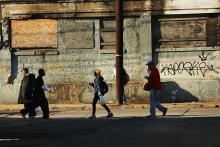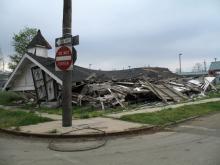Community Development

I remember the first mission trip that I went on. My youth group spent a week in New Orleans helping a local missionary group run a Vacation Bible School for neighborhood kids. Our objective, we were told, was simple: bring Jesus to a place where he was desperately needed but was often rejected. The implication that I drew, at 15 years old, was that the poverty and the street-side memorials for victims of gun violence I was seeing, and the seeming absence of almost any man over 30, existed because this community had rejected Jesus. If only Jesus were in their hearts, everything would be different.

Local sports teams can serve as a training ground for young leaders. Kaepernick, and others who have knelt, are not merely using their platform for a political message — they are trying to tell us something about who they are and what they’ve gone through to get there.

Over the last quarter century, groups like CCDA have challenged churches to be involved in community development, but there has been significantly less conversation about churches entering into the work of economic development. To do economic development well requires cultivating a wide range of collaborations – with government, corporations large and small, funders, non-profits, etc. – which is not only a slow, complicated, and intense work, but one that might raise theological red flags from many churches. I would challenge churches that might be uneasy about these sorts of collaborations to consider the image of the church in Ephesians 3, bearing witness of God’s wisdom to the powers and authorities. How better to bear witness than in relationships that focus on the health and flourishing of our neighborhoods?

I recently heard that the state of New Jersey plans to evict the Camden Children's Garden from its 14-year-old home.
I don't know if you know much about Camden, N.J., but it's one of the cities in our country that wrestles with a myriad of social issues. There are a number of incredible people there that work tirelessly to improve the living and social conditions. Mission Year has spent a number of years living and working beside neighbors and friends in this city. The people there are very committed to things like improving housing, education, and tackling food desert issues, and they have very little resources with which to work.
“Ultimately, we have just one moral duty: to reclaim large areas of peace in ourselves, more and more peace, and to reflect it toward others. And the more peace there is in us, the more peace there will also be in our troubled world.” – Etty Hillesum, Dutch diarist who died at Auschwitz
The social fabric that wove together Amani’s moral values and passion for peace is the target of rebel groups that destabilize and destroy communities. Amani grew up playing football and attending school and church in an area that has been chronically unstable for the past 16 years.
Despite the threat, Amani learned within his local structures the power of community in overcoming insecurity—the hub for gaining moral and intellectual values “to make every effort to come together and live as a community.”
Congo is still suffering from the overspill of the Rwandan genocide, the aftermath of which took the lives of both of Amani’s parents. Rebel groups roam the Kivu provinces of eastern Congo and seek to unravel the very social fabric of Amani’s community.
Taking heart from the moral lessons he gained from playing football with his school and through his education, Amani decided to overcome the insecurity caused but he rebels by bringing people together by providing a peace market—a community nucleus for women, children, and men to gather in a safe, empowered, and peaceful environment to care for one another.

I was having lunch with another couple in ministry that shared a disturbing story with us. The problem isn’t so much in the uniqueness of the story they told, but rather in how incredibly common it is.
The couple had connections to a congregations several hours away that is located in the heart of a thriving urban center. The aging congregation was down to only 40 regular attendees and had released all of their paid staff, opting instead for volunteers to lead worship for them when they could secure them.
Meanwhile, they gathered in a building, valued at roughly $9 million, which they could not afford to maintain.
This church, like so many others, seeks answers to questions about how to survive in an increasingly secular, disparate, and religiously wary culture. Their hope, like plenty of other churches, is that something or someone will come along to save them, keep the institution going and propel them into the future for another century.
Oh, as long as they don’t have to change.

Nane Alejandrez had plenty of opportunities to die. Instead he chose life, and brought generations of Latino youngsters with him.

How community-based investing transforms individuals - and religious institutions.
